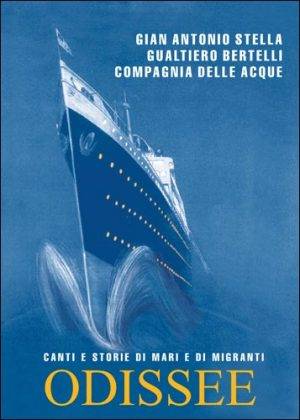The Immigrants’ Hardships and Good Fortune as Told through Song, Photos, and Narration
Friday night, at NYU’s Casa Italiana, I was fortunate to attend the multi-media performance of Compagnie delle Acque, a socially committed musical quartet of piano, guitar, accordion, and vocals, interspersed with a sensitively accurate, historical narrative written by Gian Antonio Stella. Based on Stella’s ODISSEE, Italiani sulle rotte del sogno e del dolore (2004), the various songs and narration detailed the many hopes as well as disappointments that Italian emigrants experienced during the historical period of the Italian diaspora from the late nineteenth century through to the early twentieth.
Songs, slides, and narration served as the foundation for the group’s telling of such a dramatic and, in some cases, still overlooked story. The songs derived from a long tradition of folk music that originated from those experiences. The many slides that accompanied the singing exposed the audience to innumerable street scenes of the era, photos of the traveling conditions of third-class steerage the immigrants had to endure, original documents, and, in some cases, samples of intelligence tests these same immigrants were to surpass in order to enter their host countries. Stella’s narration, in turn, was, at the same time, powerful in content and tone and equally perceptive of the trials and tribulations our ancestors had to bear.
The combination of these three different media was perfectly coordinated so that the spectator remained constantly engaged by one if not two of his/her five senses simultaneously; it was impossible to lose interest at any time during this slightly more than one hour and thirty minutes of constant vocal, visual, and narrative performances.
Gualtiero Bertelli (accordion, guitar, vocals), Giuseppina Casarin (vocals), Rachele Colombo (vocals and guitar), and Paolo Favorido (piano) make up the Compagnie delle Acque. Their repertoire consisted not only of traditional folk songs, as I mentioned earlier, but also of a number of pieces composed by Bertelli himself, which fit perfectly, in content and form, into the historical repertoire. Stella, in turn, complemented the vocal and the visual with his detailed and nicely articulated narrative of the Italian emigrant’s diasporic experience to northern Europe, the Americas, and Australia. All of this was brought to a most powerful conclusion that contrasted Italy’s historic “emigration” to its current “immigration,” a strikingly unforgettable, visual ending.
A most successful tour de force indeed! And who better to tell this story from an Italian perspective than Gian Antonio Stella, author of at least four important books on the subject at hand and, among Italian intellectuals writing on the topic today, the most cognizant of the immigrant’s plight. Let us not forget that his historical book L’orda, quando gli albanesi eravamo noi (2002) was a wakeup call, to be sure, for all those in Italy, especially for those who suffered from historical amnesia. This Friday night’s performance put together by Stella and the Compagnie delle Acque is, for sure, that second alarm once the snooze bar goes off!


































i-Italy
Facebook
Google+
This work may not be reproduced, in whole or in part, without prior written permission.
Questo lavoro non può essere riprodotto, in tutto o in parte, senza permesso scritto.